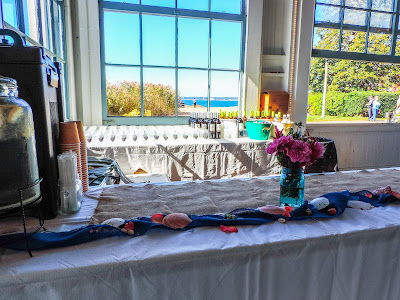By Bill Duesing
 Science is the way we study, learn about and organize information
about the world we live in, building a body of knowledge that may help us
understand the ways of the physical world. However, Science is ongoing; it
keeps discovering more big picture concepts and important details about the way
things work. Even after centuries of
scientific research, some areas of our world are still largely unknown - the
soil and the human microbiomes, the details of cancer and of climate change.
However, too much reliance on Science can lead to an unwarranted and dangerous
hubris, especially among non-scientists with an agenda.
Science is the way we study, learn about and organize information
about the world we live in, building a body of knowledge that may help us
understand the ways of the physical world. However, Science is ongoing; it
keeps discovering more big picture concepts and important details about the way
things work. Even after centuries of
scientific research, some areas of our world are still largely unknown - the
soil and the human microbiomes, the details of cancer and of climate change.
However, too much reliance on Science can lead to an unwarranted and dangerous
hubris, especially among non-scientists with an agenda.
Recently, Science has also been used extensively as a weapon to
convince us of the validity of a specific corporate or political agenda.
(Remember the doctors who promoted a brand of cigarettes in the 1950s and the
experts who told us we'd be better off eating margarine or using chemical
fertilizers.) This strategy involves Science that is very reductionist and
applied to extremely complex systems - and the notion that Science has the
final answer. It was easier to promote smoking, hydrogenated fats and
fertilizers as scientific before we understood about microbiomes, cancer and
climate change. Yet, without knowing the Scientific explanations, many traditional
cultures intuitively nurtured those microbiomes with compost and fermented
foods.
I first noticed this manipulative use of Science when CT NOFA was
working with our partners to pass a law prohibiting the use of pesticides on
Connecticut school grounds. Of course,
the folks who apply pesticides wanted to keep applying them. After all, that's their business model. They planned to work with the scientists at
UConn College of Agriculture, Health and Natural Resources to get
"science-based" answers about the use of these pesticides to maintain
school grounds. But those answers would
be in the context of horticulture, because that is the expertise of this branch
of UConn. They likely wouldn't include
the very complicated science of how pesticides might effect children and their
rapidly growing bodies differently from the healthy adult males used as the
threshold for pesticide safety. Such a science-based study wouldn't include the
effects of the so-called "inert" ingredients that make up most of those pesticides because
they are trade secrets, even though they may be more toxic than the active
ingredient. Science can't really provide the whole risks and benefits picture
of using pesticides on school grounds because so much of Science is narrowly focused
on part of a system with lots of variables- timing, weather, skill of
applicators and human behavior, especially children's. It just doesn't make sense to apply poisons
where young people play. Yet, narrowly
based Science can say otherwise.
Science of GMOs
Genetically-engineered seeds or GMOs is an area where the
corporate and political backers are using "science-based" research to
belittle those who question the wisdom of the genetically-engineered foods
experiment which now has most of our food plants sprayed with at least one
herbicide. Soon two dangerous herbicides will be applied.
They say get with the GMO program or you are anti-science and
denying the facts. Never mind that those facts are skewed and limited.
If the GMO folks want us to think about Science, perhaps they
shouldn't design a system which is bound to fail if nature's ways are taken
into account. Of course, if you spray
the same herbicide year after year on the same field, weeds will become
resistant to that herbicide and evolve into superweeds. This
genetically-engineered, herbicide-tolerant system is doomed to fail as it
demands more and more herbicides.
Altered Genes, Twisted Truth
Steven Druker's remarkable book, Altered Genes, Twisted Truth:
How the venture to genetically engineer our food has subverted science,
corrupted government and systematically deceived the public, got me
thinking about the use of Science as a propaganda tool. Jane Goodall calls this
book "one of the most important books of the last 50 years."
Druker documents nearly four decades of the arrogant use of
selective Science to promote a political and corporate agenda which favors
biotechnology. From the early discussions in the 1970s of whether this
technology was safe and could be contained in a lab, through President Reagan's
deregulatory push in the 1980s, to the discussions of whether the products of
genetic engineering were safe to release into the environment or for people to
eat in the 1990s, there has been a clear pattern of generalizing biotech safety
to the whole field from very limited data. Dissenting scientists have been
ignored and others who question this technology or the safety of
genetically-engineered food have been discredited.
A public interest attorney, Druker initiated the lawsuit that
forced the US Food and Drug Administration to release its files related to
genetically-engineered foods. He found that the FDA ignored the concerns its
own scientists had about the safety of foods made from GMOs. The FDA actually violated the law when it
declared that GMOs had a "Generally Recognized as Safe" (GRAS) status
and therefore could be included freely in our food system, without longitudinal
studies to determine their safety.
The author details how after a small, select conference in the
1970s found that adding genes to one kind of bacteria seemed safe, folks with
political and PR skills used that limited finding to declare that genetic
engineering of other organisms must also be safe. He also details how the finding that a
specific novel protein made by bacteria in a lab is safe to consume (at least
in very short term tests these decisions were based on) leads to approval of
that protein when it comes from an engineered corn plant sprayed with
glyphosate. Scientists who dealt with whole organisms and with ecological
relationships were largely excluded from the decision-making process. Holistic
methodology was ignored.
The Alliance for Science organization at Cornell
University is one organization which has been using Science to promote GMOs and
diffuse the opposition. It is funded by the Bill and Melinda Gates Foundation
to promote biotechnology around the world. Major newspaper articles generated
by the Alliance earlier this year linked GMO skeptics with those who deny
man-made climate change and evolution.
However a very recent article by Steven Druker recounting
his visit to the Alliance for Science suggests that there may be an opening for
a more thorough and honest discussion about GMOs there. Let's hope so. The Bioscience Resource Project arranged this
visit. The project also publishes IndependentScience News. Both of those sites are good sources of information.
However, late October produced another story of the influence
those who want to sell pesticides have over government researchers, in this
case a USDA scientist who faced retaliation after publishing a study of the
dangers of neonicotinoid pesticides to monarch butterflies. Read this
whistleblower story here.
While an appeal to Science is used to push a toxic corporate
agenda, organic agriculture is often deemed not scientific, even though is it
much more respectful of the way nature works.
Jill Richardson describes the scientific support for organic agriculture
in her recent essay.
What can you do?
You should support the efforts to keep the Senate from passing
the Safe and Affordable Food Act which would prohibit state and federal laws
requiring GMO labeling. You can see why it is more commonly known as the
Denying Americans the Right to Know or DARK Act. Read here about the
Senate hearing on this bill which the House has already passed. If it is passed in the Senate, our last hope
is that President Obama, who once promised to label GMOs, will veto it. If the
DARK act becomes law, our CT Labeling Law becomes illegal.
If the DARK Act doesn't become law, there is reason to believe
that in the next legislative session we can pass a Connecticut law which will
reduce the requirements (called the trigger) needed before our state law goes
into effect. Currently, it requires four states with at least 20 million people
to pass similar laws.
Things are different than they were when the law was passed two
years ago. The Vermont labeling law goes into effect next July. Maine has a law
similar to Connecticut's. Massachusetts
and Rhode Island are close to passing labeling legislation. We also know more about the dangers of
glyphosate than we did then. We know that soon many of our foods will be
sprayed with 2,4-D (half of Agent Orange) in addition to glyphosate. So there is no reason we shouldn't have the
right to know what is in our food now.
Get the fact sheet on why legislators should remove the trigger here.
If you are interested in helping make this change a reality,
there are several things you can do now.
1. Call
your state representative and senator and talk to them about removing the
trigger. Let them know how you feel and
explore their thoughts.
2. Find
local farms, businesses and organizations that will support us in this effort.
Get involved. This is
important work that effects the future of our food system.









